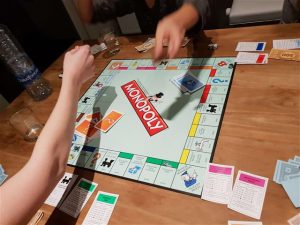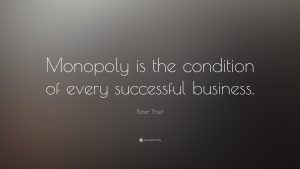Monopoly is a game of luck, strategy, and people skills. No strategy will guarantee you a win; that’s one of the reasons Monopoly is so interesting. In any given game, a newcomer, even a child can beat a lifetime champion. To win monopoly, you need to bankrupt all of your opponents before they can do the same to you. With each decision you make, it’s essential to consider the best ways to improve your chances and beat the competition. While luck is a factor in winning Monopoly, fortune can be fickle – easily turning against you when your guard is down.
That’s why we love Monopoly and Financial education class 10 was playing a game of Monopoly. Monopoly is the most popular game to teach kids about rental properties but you as a parent also learn a lot about the characters of your children if you pay attention. Here’s a reflection on our financial literacy class.
Key Learnings from the Game with the Kids
As dad, the banker and player distributed $1500 in Monopoly money to each of the players, kids started to discuss their strategies as the game started to kick off.
Be willing to negotiate and be nice!
It can be advantageous to purchase properties to block other players from creating monopolies, opening up trade possibilities later in the game.
A huge part of Monopoly is negotiating. Instead of buying only the properties you want, we allow that you buy a property and resell it to another player if he wants it to complete his street. Negotiations skills show whether you can be very friendly and sociable. It’s pretty simple: “People will work with you if they like you.” If you want to be an asshole, you can block another opponent to complete his street. In our game with the kids, the negotiations tactics of all kids were interesting to watch. One kid tried to maximize the return on each sale and he managed to ask and get paid 3 times the value of his property purchase price. Two other kids were more sociable and friendly and asked reasonable prices. Learn how your kids negotiate and think.

Don’t gloat if someone doesn’t collect rent
Oh, was the banker busy paying someone his $20 Income Tax Refund so he didn’t notice you landed on Park Place which he just built up with houses? Don’t laugh in someone’s face when you get away with not paying rent. Being honest in landing on a property and paying rent is another interesting element of the game you can watch. The game can be fast paced and when someone is landing on your property, you will learn which kid doesn’t want to pay and forget to say “oh..should I pay?”.
Charity and/or Loans
Who supports you and who wants your money ? As the goal of the game is to bankrupt your opponents, you can quickly figure out who of your kids is friendly and who’s there to win… At a certain moment, daddy had no more money and I ended up in jail. The first one to support me with 200$ was my daughter. She figured I could use some help. How nice..
The boys were trying to get the maximum amount of money. One was already in serious debt and the other one kept on collecting more money. He was friendly enough not to ask a loan with an interest from the bank, but just keep a payback scheme on their mobiles…lol. So the bank didn’t get involved with any loan as the whole family arranged their debt amongst each other.
Who did win the game ? The game was won by the youngest 10 year old daughter who maximized her investments on the two most expensive properties on the board. One son was seriously in huge debt. Another son was just break even on his cash flow.
How to Win a Game of Monopoly
If you google “How to Win Monopoly”, you will get more than 39 million results.
In 2009 Bjørn Halvard Knappskog won the Monopoly World Championship in Las Vegas, earning himself a whopping $20,000 in the process. At the time, the Norwegian business student was a complete unknown entity within the Monopoly community, but during the final he finished his opponents in less than 40 minutes. He shared his secret strategy.
10 Essential Tips from a ‘Monopoly’ World Champion
Mathematicians Hannah Fry and Thomas Oléron Evans have crunched the numbers. Forget utilities — these are the properties you really should be investing in. Here’s how to win at Monopoly, according to math experts.
I’m a big Monopoly fan and I came across the website page of Tim Darling that did something I’ve always wanted to do: calculate how long it takes to return your investment in the various properties and houses/hotel purchases. Knowing this is really the key to developing a strategy to win the game. Without it, how do you know whether to focus on putting hotels on Boardwalk or buying all the Railroads? You can’t do everything – the key to winning is making the right trades and decisions at the different stages of the game. This is just my interpretation of the numbers, but I propose a winning strategy below and then back it up with the data.
The return on investment data used on this page comes from Truman Collins’ webpage: Probabilities in the Game of Monopoly. The odds of landing on any given square were calculated by creating a model of the game (with all of Chance cards, Go To Jail, etc. included) and running billions of computer simulations. The page of Tim Darling summarizes the data, makes a visual chart to easily interpret it, and synthesizes those interpretations into a few simple rules that make up a winning strategy.
How to Win at Monopoly® – a Surefire Strategy
What if you would play Monopoly with real money ? Playing Monopoly with his children one night, Adam Carroll noticed they were bending the rules. He wondered, “What if they’re playing this way because the money isn’t real?” In this TED talk, Carroll explains the concept of financial abstraction, and how our human perception of spending changes when the idea of money becomes more or less real. His case study: a do-over game of Monopoly with his kids, this time using real money.
TED TALK : Ideas Spreading the World
Have you played Monopoly yet with real money ? We haven’t but an interesting thought to do so in the future.
Final Words
Which board games do you play with your kids to learn how to deal with money ? I think board games are the best way to learn in a fun and interactive way about the characters of your kids and how they deal with money. Would they do the same with real money ? That is a question I definitely want to check going forward. Now it’s time to work out our next financial education class. 8 Financial Literacy classes is the objective this year.
Stay tuned and we will tell you all how we progress ! Thanks for reading. In 2019 we will send out ONE newsletter per month to our blog followers. Life can be busy sometimes and people lose track of following a personal finance and travel blog. Subscribe and you will get one email per month highlighting what you missed…
Thanks for following us on Twitter and Facebook and reading this blog post. We end with a quote as always.


No Comment
You can post first response comment.